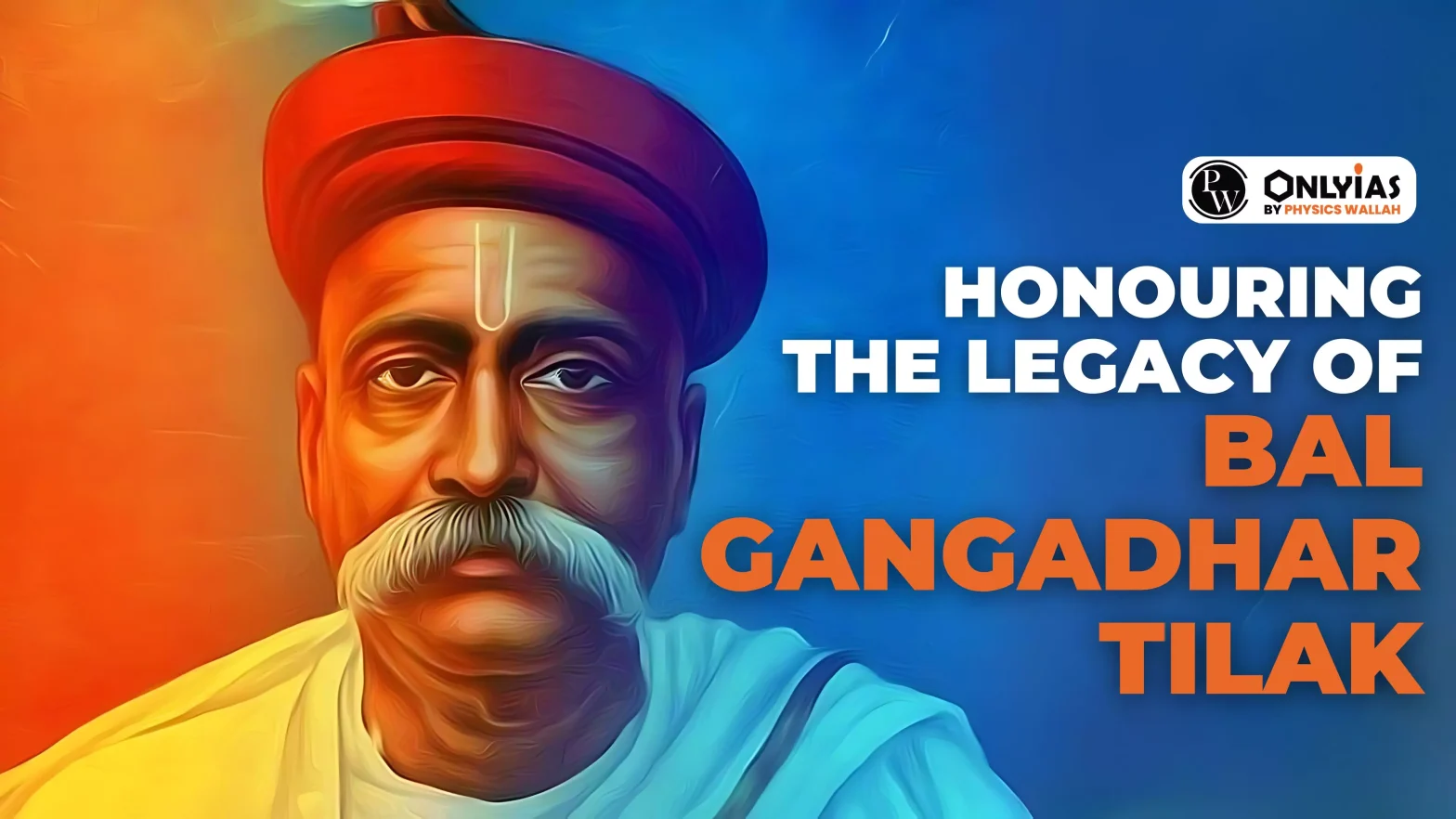As the nation commemorates Tilak’s 168th birth anniversary, we reflect on his profound influence on the independence movement and his contributions as a reformer.
| Relevancy for Prelims: Tilak Swaraj Fund, Home Rule, Kesari, Bal Gangadhar Tilak Works, etc.
Relevancy for Mains: Approaches and Ideologies of Bal Gangadhar Tilak, Bal Gangadhar Tilak’s impacts on the Indian independence movement etc. |
Legacy of Bal Gangadhar Tilak
- In 1921, Mahatma Gandhi’s visit to the Nellore district marked a significant moment in India’s freedom movement.
- He inaugurated the Satyagraha Ashram in Pallepadu and delivered significant speeches at the Town Hall and V.R. College.
- At the Rebala Lakshmi Narasa Reddy Town Hall, he unveiled a portrait of his political mentor, Bal Gangadhar Tilak, emphasizing Tilak’s profound patriotism and leadership.
Enroll now for UPSC Online Classes
- Gandhi extolled Tilak’s legacy, invoking the ideals of “Swaraj” (self-rule) and characterizing the Non-Cooperation Movement as an act of ‘self- purification.’
- He urged contributions to the ‘Tilak Swaraj Fund’, established in 1920, to support educational institutions, Khadi promotion, and Swadeshi efforts. It was a successful mobilized mission.
- July 23, 2024, marked the 168th birth anniversary of Bal Gangadhar Tilak, also revered as “Lokmanya” and “The Lion of Maharashtra”.
- This is for his dual role, as a freedom fighter and social reformer.
- His impact has also been underscored by notable figures, such as British journalist Valentine Chirol who termed him “the father of Indian unrest,” while,Jawaharlal Nehru hailed him as “the father of the Indian revolution” and Mahatma Gandhi recognized him as “the Maker of Modern India.”
- A distinguished Sanskrit scholar and thinker, Tilak was also a visionary leader.
- Sri Aurobindo, in his collection of Tilak’s writings and speeches, emphasized Tilak’s transformative influence on the Indian National Congress, reshaping it from its occidental characteristics to embrace mass participation in the freedom struggle.
- In “The Intellectual Biography of Bal Gangadhar Tilak” published in the ‘Journal of Research in Humanities and Social Science’, Raj Hans Ojha, contends that “The story of Tilak is the story of India’s Swaraj, of the Indian National Congress, coming to its adulthood, and of the rise of Indian masses for the first time in quest of ‘Home Rule’ and ‘Independence’.”
- Lokmanya Tilak believed that “Swaraj is the foundation and not the height of our future prosperity.”
- We have to build a new nation, develop a new character, live the principles, which we advocate, faith in spiritual values, love of country and tolerance for views from which we differ.’ Tilak’s intellectual contributions were many.
- His works such as, “The Orion or Research into The Antiquity of The Vedas” (1893) and “The Arctic Home of Vedas” (1901), complemented his political activism.
- Despite his devotion to independence, he expressed a preference for academia, a path cut short by his untimely death on August 1, 1920, at age 64.
- He co-founded institutions like the ‘New English School’, the ‘Deccan Society for Education’, and ‘Fergusson College’, and presented a comprehensive educational blueprint to the Hunter Commission (1882 & 1919).
- Bal Gangadhar Tilak was a strategist, transcending the roles of an idealist and philosopher, and his multifaceted contributions continue to resonate in India’s historical and educational landscape.
- As a formidable journalist, Tilak was renowned for his fearless and impartial stance in his weekly publication, ‘Kesari’.
- He championed a rigorous approach to journalism, asserting that ‘Kesari’ would boldly address all issues, resisting the prevailing trend of appeasing the British and embodying its namesake’s courage.
- Bal Gangadhar Tilak also leveraged his paper ‘Mahratha’to Advocate for the People, drawing upon Hindu scriptures and the Bhagavad Gita to support his arguments.
Check Out UPSC NCERT Textbooks From PW Store
Conclusion
Bal Gangadhar Tilak’s legacy endures through his transformative influence on India’s freedom movement, his profound scholarship, and his unwavering commitment to Swaraj and national progress.
![]() 1 Aug 2024
1 Aug 2024
